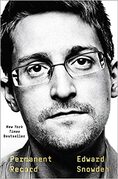 The focus of our May 4 discussion was Government Surveillance. Our lively discussion centered on Edward Snowden’s book: Permanent Record (2019). First, a little background: Edward Snowden worked for CIA and NSA from 2006–2013. His book states that during that period: “I participated in the most significant change in the history of American espionage — the change from the targeted surveillance of individuals to the mass surveillance of entire populations.” (P. 1) His concern is that the US government has gone from using surveillance to enforce laws in specific cases to having the capacity to spy on anyone at the will or whim of government officials. The system had gotten to the point where a permanent record could be kept of “everyone’s life.” (P. 3) The main questions we discussed were (1) what, if any, should be the limits to government surveillance? and (2) should Snowden have gone through the regular channels of bringing his complaint up the chain of command before revealing the government domestic spying program to the press? Perhaps the biggest issue for many of us is: Does the US government have justification to spy on its citizens at all and, if so, what can we do about it? After 9/11, according to Snowden, the government was given the capacity by law to intercept conversations between the US and foreign countries, but illegally expanded this capacity to spy on US citizens as well. When brought to court by those who believed their privacy was violated, the government stated that such programs were top secret or denied that they existed at all. The country became divided between “Us” and “Them” according to Snowden at the urging of George Bush, who justified the programs by claiming that if anyone opposed government spying, that person was helping the “enemy.” (P. 80) Let me add that Dick Cheney also was a big advocate of this program. There is a sad aspect to Snowden’s situation. He states: “I had hoped to serve my country, but instead I went to work for it. …By the time I arrived, the sincerity of public service had given way to the greed of the private sector.” (P. 111) Regardless of whether we consider his actions justified, from his view he sacrificed his future to confront what he considered the abuses of our government that needed to be exposed. He still resides in Moscow as of this day, where his passport was revoked en route to Ecuador, which was sympathetic to his cause. A large part of our discussion revolved around whether a person who sees abuses by their government should go through the chain of command in reporting the situation, or if urgency can justify exposing the issue to the public. Think about the whistleblower who brought a complaint about Trump’s conversation with the president of Ukraine. He did go through proper channels, but if that route was blocked would he be justified in bringing his concerns to the press and/or public? Should Daniel Ellsberg have released the Pentagon Papers, that showed the US losing in Vietnam while sacrificing American lives? What are the principles we rely on to determine the right path in exposing government secrets? Regardless of whether we think his actions to expose the US surveillance program was justified, Snowden makes a compelling argument regarding authoritarianism: “Authoritarian states are typically not governments of laws, but governments of leaders, who demand loyalty from their subjects and are hostile to dissent.” Perhaps the biggest question of our time is whether we are moving in the direction of authoritarianism in once-democratic countries around the world, perhaps even our own. Please recommend this newsletter to people who you think might appreciate it. If you want to be added to the list to receive each new newsletter when posted, fill out our contact form and check the box just above the SUBMIT button. You may also use that form to be removed from our list.
The book The Future of Democracy can be ordered wherever books are sold. Click ↓ (#) Comments below to view comments/questions or add yours. Click Reply below to respond to an existing comment.
0 Comments
|
 5th edition now available 5th edition now available
Steve ZolnoSteve Zolno is the author of the book The Future of Democracy and several related titles. He graduated from Shimer College with a Bachelor’s Degree in Social Sciences and holds a Master’s in Educational Psychology from Sonoma State University. He is a Management and Educational Consultant in the San Francisco Bay Area and has been conducting seminars on democracy since 2006. Archives
July 2024
Categories |
 RSS Feed
RSS Feed